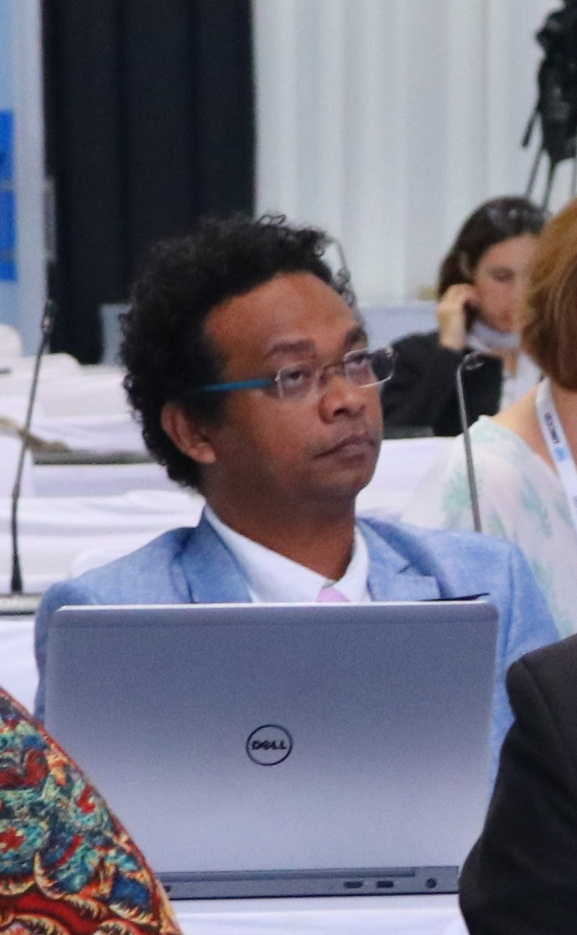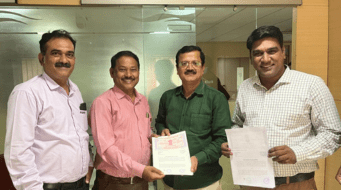By Shyna Dudeja, Arjuna Srinidhi
Policy makers, researchers, think-tanks and NGOs discuss economic perspectives and grassroots challenges to combat land degradation at side-event hosted by WOTR

Investments in land restoration are one of the most effective solutions in addressing both climate change impacts and biodiversity loss, as long as these approaches are ecologically sustainable. This was a key takeaway of the Side Event organized by the Watershed Organisation Trust as part of the recently concluded UNCCD COP 14 in New Delhi.
The event, titled ‘An economic perspective on sustainable land and watershed management to combat land degradation in India’ focused on the utility of cost-effective ecosystem restoration and management measures in watersheds implemented at the community level. The event offered a platform for sharing experiences on combating land degradation, empowering small-scale users and engaging in discussions with policy-makers on the possibilities of upscaling sustainable land management practices. The event had a focus on two scaling pathways i.e. cost-benefit analyses and the Natural Capital approach with a goal to help India create transformative projects to meet its Land degradation Neutrality (LDN) targets by 2030.
Dr. Marcella D’Souza, Director WOTR Centre for Resilience Studies (W–CReS) stressed that that for a successful LDN project, there are two Fundamental Pillars – A holistic and technically sound “Landscape” approach to soil and water conservation, “From Ridge to Valley”; and A Participatory Approach – engaging the entire community, having strong functioning institutional structures.

Zeenat Niazi, Vice President, Development Alternatives speaking on the challenges and priorities of engaging with communities on Sustainable Land Management, presented the experiences from Bundelkhand in Uttar Pradesh, whereby rejuvenating natural resource base to cope with both slow onset and extreme weather events and strengthening livelihoods it has overcome the challenges of soil degradation and climate change.

Arjuna Srinidhi, Senior Researcher, Climate Policy presented a case study on the Economic Valuation of Sustainable Land Management practices at the Kumbharwadi watershed in Maharashtra. He also spoke about the focus on policy engagement under its ‘Ecosystem-based Adaptation’ project. A key focus of WOTR’s approach to mainstreaming nature-based solutions was to find appropriate ‘windows of opportunity’ at the state (Maharashtra) and national level with regard to sectoral policies that contribute to the SDGs and climate change co-benefits.

Mark Schauer, Coordinator of the Economics of Land Degradation (ELD) Initiative in his presentation explained the background of the initiative and that the aim of the ELD initiative was to create global awareness of the economic importance of productive land and to improve the sustainable land management. He also spoke about different assessment strategies and the need for effective communication and useable, accessible information at multiple levels.

Navin Horo, National President of GIZ India, spoke about the history of GIZ’s engagement in India and the various ongoing bilateral initiatives, especially related to watershed development, its focus on sustainable land management through the ProSoil project. He also opined that technical support from universities and consultations from the ground level to a national level were needed for effective decision making for land management.

Dr. Ashok Dalwai, CEO, National Rainfed Area Authority (NRAA), Ministry of Agriculture, GoI, provided the key note address and concluding remarks with perspectives of policy makers in relevant ministries. He pointed that out while India has gone from being a food deficit country to a food surplus one, the majority of farmers are still poor, thereby presenting that the benefits of improved land productivity has not improved farmers financial capital.. He stressed that both dryland and rainfed areas should be focused on, and that for a truly sustainable approach to farming, it would have to be built on 3 pillars: the income of the farmers, nutrition of communities, and the earth’s ecology. He also stressed on the need to focus on nutrition security as opposed to food security. This approach would also lead to a diversification of cropping patterns as opposed to be a mono-cropping culture driven by a focus on just ‘calories’ being accounted for as opposed to a more holistic focus on health and nutrition. Crop diversification and a focus on locally appropriate varieties would also be more sustainable ecologically and result in co-benefits to soil health, sustainable water use and climate benefits.

The thought provoking discussions that followed the presentations left the participants with much food for thought as well as a renewed commitment to continue contributing in multiple ways to the challenge of ecologically sustainable solutions to development challenges.





